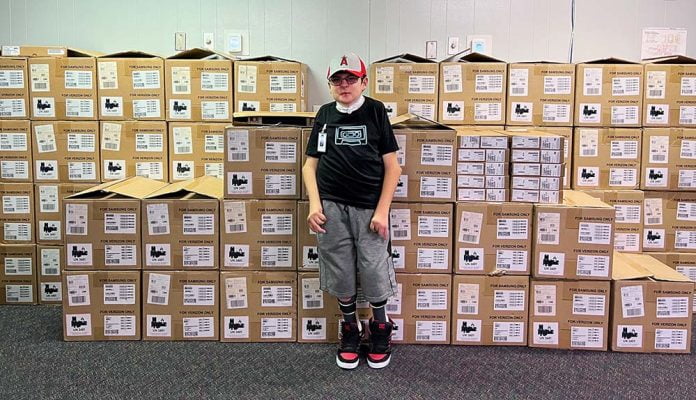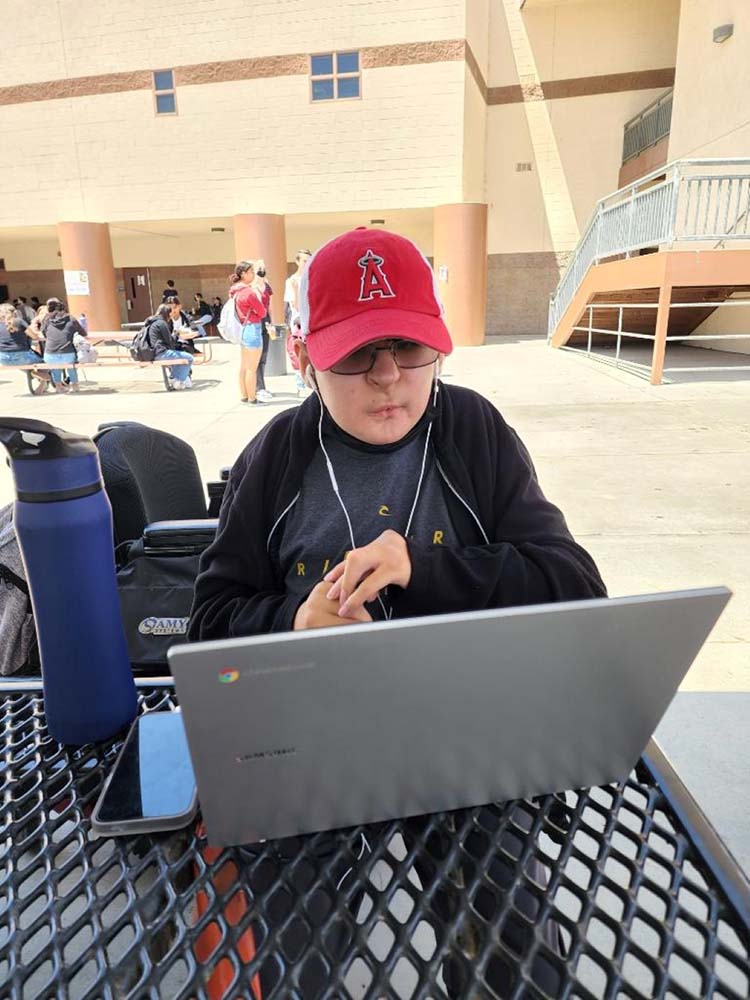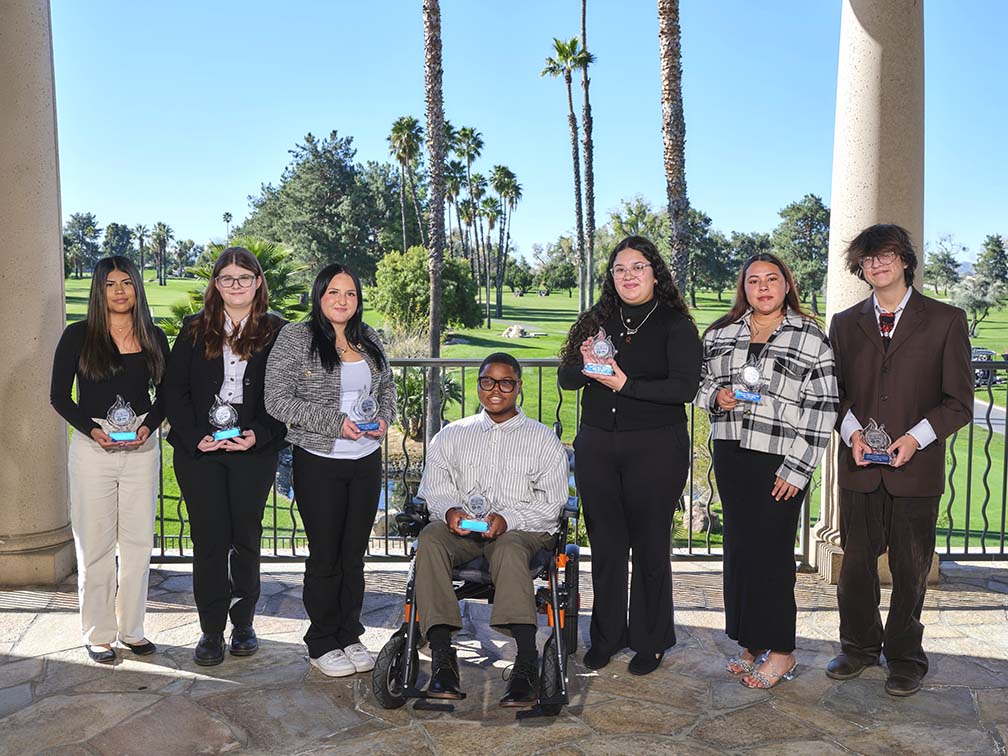
Sahid Aguilar, a junior at San Jacinto High School, has been able to learn more about computer careers while assisting his district’s technology department due to his involvement in the WorkAbility I program. WAI is California Department of Education grant funded and offers career coaching and job opportunities for students with Individualized Education Programs.
Sahid, 16, was born with Freeman-Sheldon Syndrome, an exceptionally rare genetic disorder which affects his lower extremities, including his hands and feet. Despite physical limitations, he worked during the summer of 2022 to set up 306 new Chromebooks which are now being used by San Jacinto Unified School District students.
“We loved having Sahid join our team and were amazed at how quickly and efficiently he worked,” SJUSD’s Director of Technology Chawn Lytle said. “The task he completed was so important, and it allowed Chromebooks to be ready for distribution at the start of the school year.”
Sahid said he enjoyed working with the computers and that the staff members he worked with explained the job well and he only needed to do it one time before getting the hang of it. He feels the experience will help him with an eventual career in the computer field. “It is something I enjoy; it allows me to express myself and my creativity in many ways and it suits me well with it not being anything physical,” he said.

The effects of Freeman-Sheldon Syndrome limits Sahid’s everyday activities. When asked about FSS, he said he gives the simple explanation that it is a genetic disorder that limits his muscles and tendons, and consequently his range of motion. He explained that common tasks like getting supplies from his backpack and picking up things from the ground are just things he needs help with.
“Getting from class to class can be a challenge, too,” he said. “While I do have accommodations to get from point A to point B quicker, I sometimes may run out of luck if an elevator stops working. I have had a handful of surgeries that have allowed me to overcome some limitations of FSS. The most notable I would say, would be the surgeries on my legs that allowed me to be able to walk.”
Sahid’s favorite subject is math “because it is one I can understand the best. The concepts are focused, organized and clear, which is why I like it the most.” Not letting his physical limitations define him as a person, he said, “Everyone is different, and we need to learn to work together, even though we are not the same.” He added, “The WorkAbility program has helped me discover things I would and would not like to do for my career, as well as important skills I need to have in the working space.”
SJUSD has been part of the WorkAbility I program since 2012 and annually mentors more than 150 students, placing more than 20 in paid employment with community partners. The Roman numeral I refers to the secondary high school portion of the program. There are four different levels: secondary, select adult education schools, community colleges and select California universities. Not all schools have WorkAbility grants; there are only 261 WAI grants in California.
Robynn Gualtiere, co-manager for the Region 5 State Advisory WAI Board and SJUSD Program Coordinator, has worked at the district for about 18 years. She said this is only one of two districts in the state that also has a WAI Elementary Connection grant to bring career awareness to the elementary sites for students with disabilities. She said this year the district is on track to serve approximately 200 students at the secondary level alone. Gualtiere said to consider a student served, they must provide a career assessment, employment/post-secondary education planning, career preparation and work-based learning experience, and collaboration as well as youth development and leadership.
“Our program attempts to reach all students with disabilities in the district,” she said. “I hold workshops monthly at the high school to help students with disabilities learn about various aspects of becoming a valued employee. For grades 9-12 we work on career assessments, self-advocacy, career exploration and workplace social skills. In addition, we concentrate on job safety during the freshman year, positive attitudes in looking for a job during the sophomore year, how to put your best foot forward when interviewing during the junior year, and making important outside agency connections during the senior year. I’m also available to meet with the students one-on-one when they are looking to begin a job search. Teachers in our self-contained classes work on specific job skills using curriculum provided by our WorkAbility I grant.”
Gualtiere is pleased with the successful community partnerships they have, including Walgreens, BJ’s Sporting Goods, Ramona Humane Society, T.H.E. Center and Talley Metal Fabrication. “We don’t have students working there all the time, but they have had students there on and off,” she said. “We also utilize the district sites, including many of the school sites. Of course, we are always looking for new community partners to help our students gain much needed work experience.”
The students are paid minimum wage through the program, which also covers worker’s compensation for the students since they are district employees and provides some job coaching as needed. Gualtiere said students are matched with employers based upon student interests and employer needs. “It is a win-win,” she said. “Students get exposure to various types of employment helping them decide if this is a career they would like to pursue. Employers get eager employees that are trained on our dime. Once their allotted hours are up, hopefully the employer will hire the student.”
Gualtiere went on to say, “And then there are the students like Sahid that don’t let a disability get in the way of their goals. He is an amazing young man and will go far in spite of any challenges thrown his way. Sahid is an exceptional young man with unlimited potential. It is a joy to work with him and all the WAI students. I tend to wear my heart on my sleeve and must say that Sahid’s personal insights bring tears to my eyes.”
Sahid’s mom, Maria Orozco, said her son was diagnosed with mild FSS shortly after birth. “He has had multiple surgeries ever since he was born and has attended multiple therapy sessions, which has been a challenge for him to handle as he has had to juggle surgery, therapy and school all at the same time.”
She said Sahid was in special education classes for about a month until it was determined that it was unnecessary for him to continue in that program. As a result, he began mainstream education when he was three years old.
“The biggest challenges for us have been trying to give him a life as normal as possible where he would not feel excluded and different from everyone else,” Orozco said. “The WorkAbility I program has helped him be treated like other students in that he can work and help.”
Gualtiere said she loves her job and is always excited to see student growth from freshman to senior year with respect to career possibilities. Many times students enter the program only knowing about careers they see on television or those that family members talk about with them.
“In some cases, they don’t even think they can work because they have a disability. It is great to help them discover that opportunities for a meaningful life after high school do exist,” Gualtiere said. “I recently had a young man that graduated seven years ago call me to give me an update. When he was in high school, we helped him get the training to become involved in a career in HVAC. He decided it wasn’t really for him, but he had learned through WorkAbility I that it’s okay to change careers, you just need to make an informed decision. He decided to become an airplane mechanic and now works for Amazon. He travels the world fixing their planes. Stories like this just make my heart swell with joy. Students with disabilities often see themselves as less than…it is an honor to be able to help them realize they are the ones that think outside the box and are the movers and shakers of the world.”
For more information, contact Transition Specialist/OI Specialist Robynn Gualtiere at 951-929-7700 ext. 4337 or rgualtiere@sanjacinto.k23.ca.us.
SJUSD Public Information Officer Carrie Best contributed to this story.







